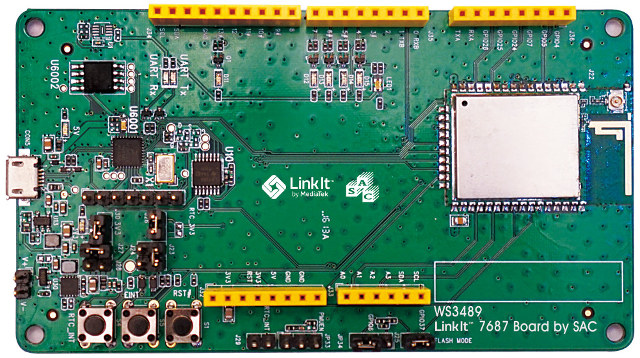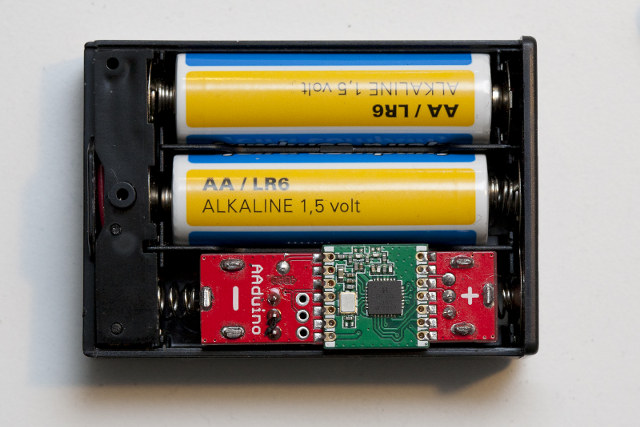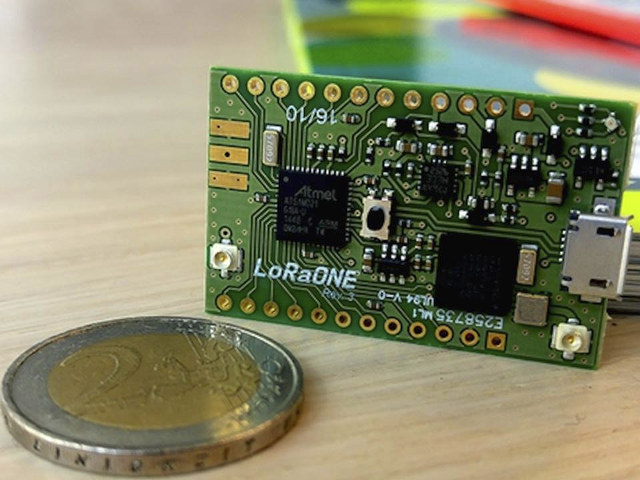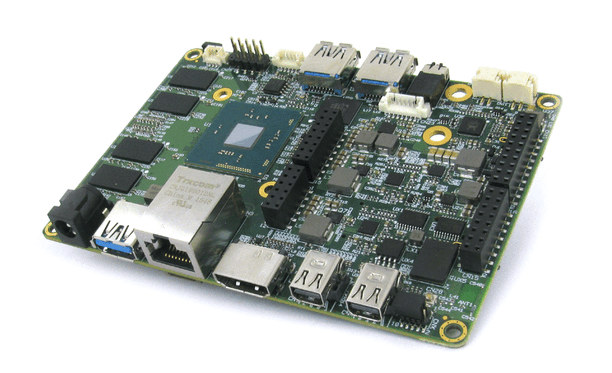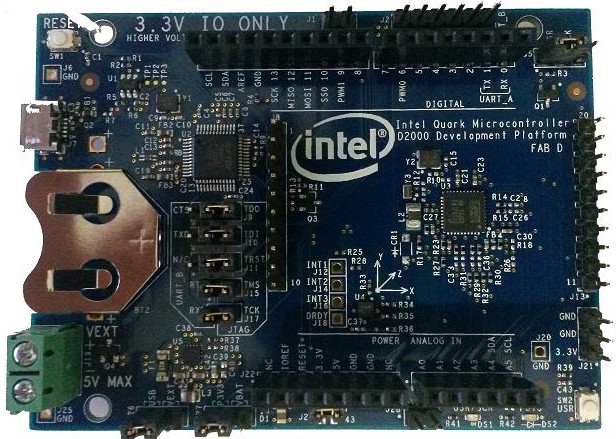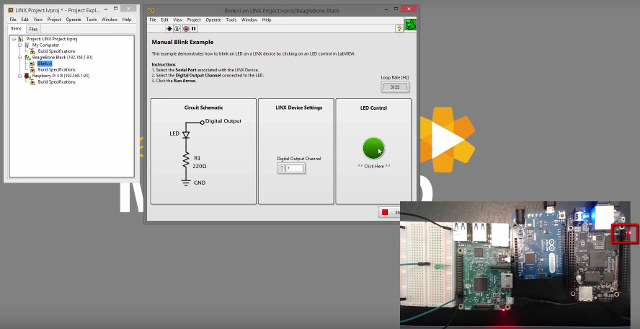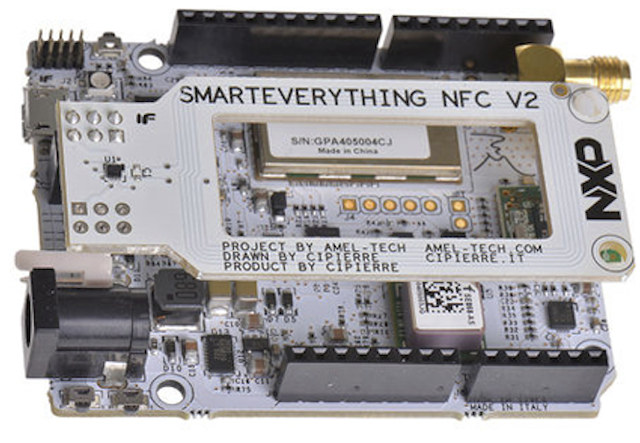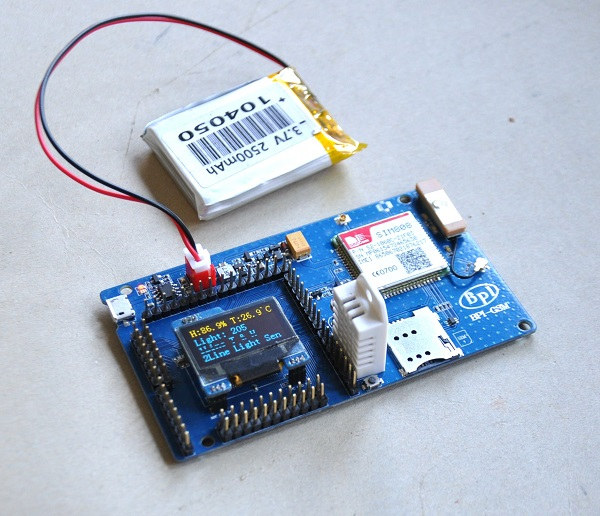MediaTek Labs has already launched several WiFi boards for IoT applications starting with LinkIt ONE, and later LinkIt Smart 7688 running OpenWrt, and the company is now about to launch LinkIt 7687 HDK (Hardware Development Kit) powered by Mediatek MT7687F Cortex-M4 SoC, running FreeRTOS, and developed & produced by Silicon Application Corp (SAC). LinkIt 7687 (WS3489) board specifications: SoC – MediaTek MT7687F ARM Cortex-M4F MCU @ 192MHz with 352 KB SRAM, 64KB ROM, and 2 MB serial flash in package, integrated security engine, and built-in 802.11n WiFi. 8×8 mm 68-pin QFN package Connectivity – 1×1 802.11 b/g/n WiFi with on-module PCB antenna and U.FL connector. USB – 1x micro USB for power, debugging (Coresight Debug Access Port + Virtual COM) Expansion Arduino Uno Rev. 3 headers + an extra 8-pin extension connector. Mass Storage Device (MSD) flash programming interface. Reserved headers for power consumption (current) measurement. Misc – LEDs for […]
AAduino Arduino Compatible Board Fits Neatly into an AA Battery Holder
Johan Kanflo has been using Arduino compatible boards based on Tiny328 MCU with an ISM radio module (wireless Arduino clone), but he found that finding a case was not easy, and was quite not ready to to design its own and print it with a 3D printer. So instead he shrank the board to fit into an AA battery case bought on Ebay with two AA batteries taking the remaining slots. That’s the result. AAduino board specifications: MCU – Atmel ATMega328p clocked at 8 MHz to save power Radio – RFM69C ISM transceiver module Sensors – Two DS18B20 temperature sensors Misc – Indicator LED Keystone battery terminals rotated 180° to act as positive and negative terminals. Power – 2x AA batteries The project is also open source hardware, with all hardware files released under the MIT license on Github, where you’ll also find a demo sketch for the board. Via […]
LoRaONE is a Small LoRa IoT Development Board Based on Atmel SAMD21 MCU, Microchip LoRaWAN Module (Crowdfunding)
While there are many long range LPWAN standards, LoRa appears to be one of the most popular with boards such as LoPy, and now SODAQ LoRaONE module hitting crowdfunding campaigns. LoRaONE is powered by an Atmel Cortex M0+ micro-controller, features Microchip RN2483 or RN2903 LoRaWAN module, GPS, and various sensors. LoRaONE board specifications: MCU- Atmel ATSAMD21G18 ARM Cortex M0+ micro-controller @ 48 MHz with 256 KB flash memory, 32KB SRAM, and up to 16 KB EEPROM (by emulation) Connectivity LoRa via Microchip RN2483 (433/868 MHz) or RN2903 (915 MHz) module depending on your region GPS via u-blox EVA 7M USB – 1x micro USB port for power and programming Expansion headers (unpopulated) 14x digital pin, 12x for analog and 8x for PWM, plus UART, SPI and TWI (I2C) Analog output pin – 10-bit DAC External Interrupts: Available on all pins DC Current per I/O pin: 7 mA Operating Voltage – […]
UDOO x86 Development Board Combines Quad Core Intel Motherboard with Arduino 101 Board for $89 and Up (Crowdfunding)
UDOO is known for their ARM based development board with an MCU to control I/Os from Arduino compatible headers such as UDOO Quad or UDOO NEO. The community has now launched a new board called UDOO x86 powered by a quad core Intel processor, and integrating the Intel Curie compute module with Quark SE MCU used in Arduino 101, and the Arduino UNO headers. The basic version will come with Atom x5-E8000 Cherry Trail Braswell processor while the advanced version will feature Celeron N3160 Braswell processor. UDOO x86 Basic and Advanced specifications: SoC Basic – Intel Atom x5-E8000 quad core processor @ 1.04 / 2.0 GHz GHz with 12EU Intel HD graphics @ 320 MHz (5W TDP) Advanced – Intel Celeron N3160 quad-core processor @ 1.6 GHz / 2.24 GHz (Turbo) with 12EU Intel HD graphics@ 320 MHz/640Mhz (4W SDP / 6W TDP) System Memory Basic – 2 GB DDR3L […]
Intel Launches $15 Quark D2000 Arduino Compatible Board
Intel introduces three new Quark Micro-controllers last year, and I already experimented with Intel System Studio tools, quite similar to the Arduino IDE, and designed for hardware such as Intel Quark D1000 Customer Reference Board. So far the company had not released any boards available to the general public, but this has now changed since they’ve launched the “Intel Quark Microcontroller Developer Kit D2000”. Intel Quark D2000 development board specifications: MCU – Intel Quark D2000 32-bit processor Intel Pentium x86-compatible without x87 FPU @ 32 MHz with 8 KB SRAM, 32 KB instruction flash, 8 KB OTP flash and 4 KB OTP data flash USB – 1x micro USB (JTAG) for power and programming/debugging Sensors – 6-axis Accelerometer / magnetometer with temperature sensor (Bosch Sensortec BCM150) Expansion options: Arduino Uno compatible SIL sockets (3.3V IO only) Booster pack compatible SIL headers (3.3V IO only) Misc – Reset and user buttons, jumpers, […]
LabVIEW Now Supports Raspberry Pi 2 & 3, BeagleBone Black with LINX 3.0 Release
LabView is a system-design platform and development environment with a graphical programming syntax that “makes it simple to visualize, create, and code engineering systems”. It’s often used with National Instruments hardware such as myRIO, but LabView Makerclub has also developed LINX to bring support to Arduino and chipKIT, and with the latest LINX 3.0, support for BeagleBone Black, and Raspberry Pi boards has been added. You’ll need Labview 2014 (Windows only) or greater to work with LINX 3.0, as well as one of the supported development boards. Complete Labview 2014 + board kits are also sold with the BeagleBone Black Physical Computing Kit and Raspberry Pi 2 Physical Computing Kit both going for $89 on Digilent. LabView files are save in VI format, and the same file can be used on Arduino, BeagleBone Black, and Raspberry Pi board with minor modifications (e.g. GPIO pin number) as shown in the blink […]
SmartEverything is a Feature-Packed IoT Board with SigFox, Bluetooth LE, NFC and GPS Connectivity, Plenty of Sensors
Atmel MCU Madness is an informal competition on Twitter where people vote for their favorite development boards. We are now at the quarter finals, and beside the usual suspects such as Raspberry Pi and ESP8266 boards, I also noticed one board that I had never heard of: AXEL Elettronica’s SmartEverything based on Atmel SAM D21 Cortex M0+ and featuring SigFox, BLE, NFC, and GPS connectivity, as well as various sensors such as humidity and temperature, 9-axis motion sensor, and so on. SmartEverything board specifications: MCU – Atmel SAM D21 ARM Cortex-M0+ MCU @ 48 MHz with 256KB Flash, 32KB SRAM Connectivity SIGFOX via Telit LE51-868 S SIGFOX 868 MHz Wireless Module with 12 months of network access included Bluetooth 4.0 LE via TDK SESUB-PAN-T2541 module based on Texas Instruments CC2541 NFC via NXP NT3H1101FHK NFC with separate antenna (included) GPS/GNSS via Telit Jupiter SE868-A GPS/GNSS module with integrated antenna. Supports […]
BPI-GSM Arduino Compatible Board Integrates a GSM & GPS Module, Sensors and an OLED Display
Banana Pi team has come up with another board, but this time it does not run Linux or Android, as they’ve made an Arduino compatible board called BPI-GSM based on Atmel ATmega2560 MCU with a light sensor, DHT22 temperature and humidity sensor, and a GSM/GRPS & GPS module powered by a LiPo battery. BPI-GSM board specifications: MCU – Atmel ATmega2560 8-bit AVR MCU @ 16 MHz with 256 KB flash, 8KB SRAM, 4KB EEPROM Connectivity – Simcom SIM808 GSM, GPRS, and GPS module + SIM card slot + Sensors – DHT22 temperature and humidity sensor, light sensor Display – OLED display Expansion headers – 54x digital I/O (including 14x PWM), 16x analog input, 4x UART. Max DC current per I/O: 40 mA. Misc – Reset button, LEDs Power Supply 5V via micro USB port 3.7V LiPo battery (2,500 mAh battery included in kit) Dimensions – TBD The board can be […]


